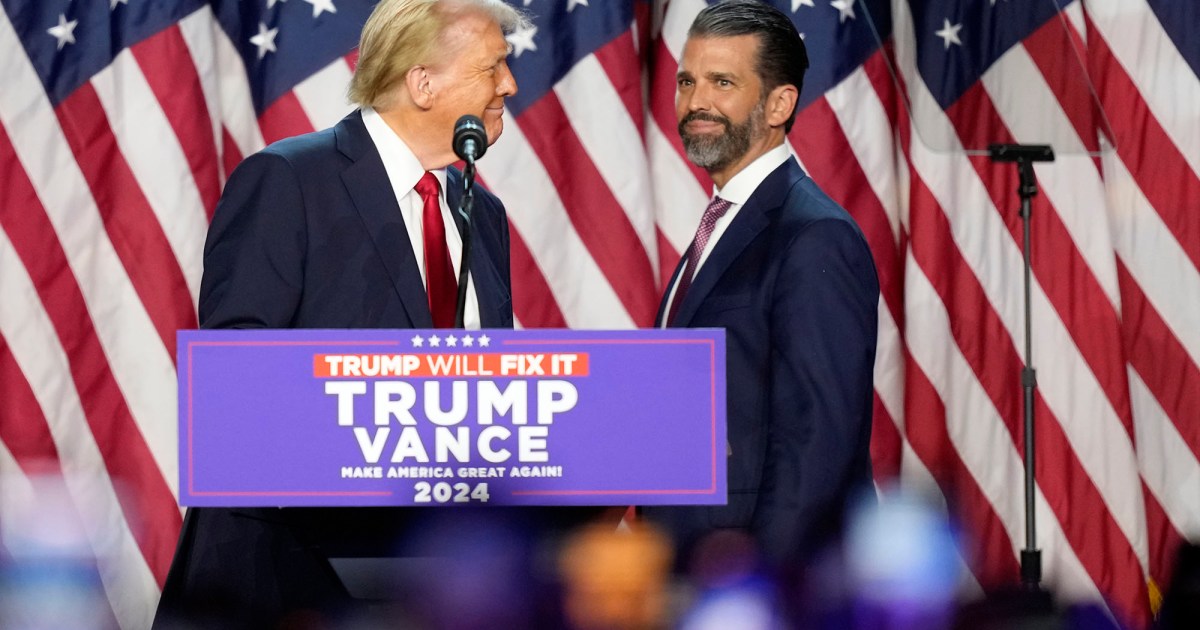
Editor’s note: The below article first appeared in David Corn’s newsletter, Our Land. The newsletter comes out twice a week (most of the time) and provides behind-the-scenes stories and articles about politics, media, and culture. Subscribing costs just $5 a month—but you can sign up for a free 30-day trial of Our Land here.
One of the most popular internet memes is the cartoon of a dog wearing a bowler and sitting at a table with a cup of coffee in a room engulfed by flames. “This is fine,” the pooch says. The image from comic artist KC Green became a viral sensation a decade ago, used a gazillion times since to convey the message: “This is not fine.” The Super Tuesday primary contests this week yielded one of the biggest not-fine moments in US history: The confirmation that Donald Trump (absent an act of God) will once again be the presidential nominee of the Republican Party. And far too many Americans are that dog, settled calmly within a conflagration and saying, “This is fine.”
The firehose of outrages in the Trump era has run nonstop for nine years of lies, hatred, sleaze, malfeasance, conspiracism, and demagoguery. The shock is gone. So many of us are exhausted. It might be hard to summon up the necessary indignation or fury at the fact that millions of Americans have voted to restore Trump to power—after he plotted to overturn an election and incited insurrectionist violence to overthrow the government. After he was twice impeached (and, in the second impeachment, found guilty by a bipartisan Senate majority that fell short of the two-thirds needed for conviction). After he was indicted twice for conspiring to mount a coup, and once for allegedly swiping top-secret documents, and once for paying hush money to a porn star to cover up an alleged extramarital affair. After civil trials found him guilty of massive business fraud and liable for sexual assault and defamation.
Of course, this is not fine. But the nation’s No. 1 problem is that millions view it as acceptable, if not desirable. The nation is a huge step closer to placing in the White House an authoritarian wannabe who attempted to annihilate the constitutional order and who has openly indicated that if elected he will move to seize greater power by seeking near total control of the civil service, ordering the Justice Department to launch criminal investigations of his political foes, and using the Insurrection Act of 1792—which hands the president unchecked power to deploy the US military on American streets—against domestic opposition.
Trump’s restoration to the presidency is not preordained. But it does feel as if America is sleepwalking toward autocracy. An entire political party has rolled over for this narcissistic scoundrel. The conservative movement has become his cult. And right-wing media has become cheerleaders for his crusade of grievances, division, resentment, paranoia, and bigotry. All the pro-Trump forces amount to a minority of the nation. Most Democrats and many independents are alarmed by all this. Yet not enough Americans are worried about the peril at hand, and that may allow the authoritarians to slip past the gates.
This is a break-glass moment. Trump’s agenda for his sequel would subvert, if not blow up, democratic institutions and safeguards. His assaults on the republic might not be reversible. Alarm klaxons are not sounding loudly enough.
The New York Times this week offered one possible reason: Many voters have forgotten the tumult of the Trump years. The newspaper put it this way:
More than three years of distance from the daily onslaught has faded, changed—and in some cases, warped—Americans’ memories of events that at the time felt searing. Polling suggests voters’ views on Mr. Trump’s policies and his presidency have improved in the rearview mirror. In interviews, voters often have a hazy recall of one of the most tumultuous periods in modern politics. Social scientists say that’s unsurprising. In an era of hyper-partisanship, there’s little agreed-upon collective memory, even about events that played out in public.
The Times article observed, “The erosion of time appears to be working in Mr. Trump’s favor, as swing voters base their support on their feelings about the present, not the past.”
This is unsettling given the cataclysmic events of the Trump presidency. Besides its denouement with the Capitol Hill riot, there was the hellish pandemic in which Trump’s mismanagement led to the avoidable deaths of hundreds of thousands of Americans. This alone should be a disqualifier for Trump. But even that disaster gets lost in Trump’s foul wash.
The Times listed some of the more odious Trump episodes that now seem forgotten:
The recording of Mr. Trump saying he could grab women by the genitals. Praising Russian intelligence. Crudely disparaging African countries. Separating children from their parents at the Mexican border. Telling children Santa Claus isn’t real. Considering buying Greenland. Suggesting using nuclear weapons to stop a hurricane. Threatening to withhold aid from Ukraine if its president wouldn’t investigate the Biden family. Suggesting Covid patients inject bleach.
It also referenced Trump’s absurd love affair with North Korean dictator Kim Jong Un, the government shutdown Trump caused, his broken promise to have Mexico pay for the border wall, his description of participants at a white supremacist rally in Charlottesville, Virginia, as “very fine people,” and the January 6 riot.
Not surprisingly, this roll call left out much. Remember “shithole countries” and the greenlight Trump gave to Chinese President Xi Jinping for imprisoning Uyghurs in concentration camps? Also not on the list was the original sin of his presidency: Trump aiding and abetting the covert Russian operation that helped elect him president and his subsequent attempt to cover all that up with false claims it was a hoax. The Times won a Pulitzer for its coverage of this story, and it was missing.
During his rather-fine State of the Union address, President Joe Biden slammed Trump for his worst moments—January 6, “bowing” down to Vladimir Putin, bragging about killing Roe v. Wade—and depicted him as a danger to democracy. But even in a speech over an hour, Biden could only cover so much. (You can read my report on Biden’s State of the Union here.)
As I read the Times story, I wondered to what degree the paper of record and other media institutions bear some responsibility for all the forgetting. While the Times and other major outlets have often provided insightful coverage of Trump’s misdeeds, his authoritarian impulses and plans, and the threat he poses, they still often report on him as a conventional politician. I haven’t mounted a statistical analysis, but my hunch is that many of their stories on Trump are horse-race pieces that treat him as a prominent candidate. Such coverage tends to normalize this abnormal politician.
Perhaps this is being too harsh on the NYT. But there have been many outrageous actions from Trump that have not been highlighted in its pages. As I noted in December 2022:
The day after Donald Trump, a former president and the leading contender for the Republican presidential nomination in 2024, called for the “termination” of provisions of the US Constitution governing elections and essentially demanded that he be declared the “rightful winner” of the 2020 election, neither the New York Times nor the Washington Post ran a front-page story reporting Trump’s call for ripping up portions of the nation’s founding document. No mention of this even appeared in the Times that day. Trump’s unprecedented and dangerous statement was not deemed a big deal. This raised a question: Have major media players still not figured out how to cover Trump’s extremism?
The media is not the only cause of Trump amnesia. Human nature may be such that many of us are just not able to endlessly remain in a state of outrage and anger. Time can smooth out memories and, in some cases, even trauma. But those who do pay attention, and this includes journalists, are obliged to maintain the focus on the big story: A threat to the republic is upon us, and it will come to pass unless enough Americans decide this is not fine.
David Corn’s American Psychosis: A Historical Investigation of How the Republican Party Went Crazy, a New York Times bestseller, has been released in a new and expanded paperback edition.
Mother Jones illustration; Gripas Yuri/Abaca/Zuma















